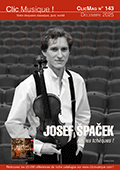 The Six Sonatas for organ op.65 by Felix Mendelssohn-Bartholdy, commissioned by the editors Coventry and Hollier in London, represent the synthesis of the full artistic and creative maturity of the composer. The passion for this instrument revealed very early in the musician’s life, as witnessed by the fact that he wrote his first composition, “Sei piccoli pezzi”, when he was only 12. His incredible talent in composing for organ was due not only to his constant interest, but also to the many years of attendance with prestigious teachers (he studied harmony and counterpoint with Friederich Zelter while he gained a solid mastery of the instrument with August Wilhelm Bach, who was then the titular organist of the Marienkirche in Berlin) and to the focused knowledge of Bach’s masterpieces. It is indeed important to remark that, as is well known, Mendelssohn played a fundamental role in their rediscovery. He was renowned and appreciated for his interpretation virtuosity as well as for his mastery in improvisation. He was invited, not yet an adolescent, to play in Germany in different concerts, among which we remember those in Weimar in 1821 and in the Bern cathedral the year after. The experience gained in this period was decisive when, between the summer of 1844 and January 1845, Mendelssohn started to compose the Six Sonatas. We can recognize therein different genres like the theme with variations or the aria with “da capo” and the use of several composition techniques in the treatment of single movements. If the fourth Sonata played a pioneering role towards the organ symphony of the 19th century, with the sixth Sonata Mendelssohn composed what we could consider the first “Sonata ciclica”. The theme of the choral “Vater unser im Himmelreich” became the starting point and the pretext not only for the elaboration of the first four variations, but also of the last two movements (the subject of the fuga and of the conclusive Andante are built essentially on the same choral), transforming them into the fifth and the sixth variations. An amazing counterpoint technique appears also in the “Allegro moderato e serioso” of the first Sonata in F minor, where the subject of the “Fugato” is masterfully developed, interrupted in some points by the harmonization of the Choral “Was mein Gott will, das g’sche hall zeit”. The same magnificent counterpoint technique reappears to remark the outstanding qualities of the German composer in the elaboration of the double fuga of the third Sonata in which the Choral “Aus tiefer Not schrei’ ich zu dir” appears, sustained by the pedal. The idea of an organ with more tonal and expressive resources can be identified in the use of violent sound contrasts, like in the “Andante recitativo” of the third movement of the first Sonata or in the great opening of the third Sonata, where a simple theme, declaimed through the second keyboard, is alternated to the powerful chord masses of the first one. In the same way the drawing of the dotted quavers design that characterises the pedal of the “Andante con moto” of the fifth Sonata expresses effectively the usual method of “pizzicato” in the strings. The technique entrusted to the pedal notes reveals to be innovative for the time. Mendelssohn resorts to it confidently in his Sonatas assigning to the pedal difficult passages. In this way he provided a significant boost to the building of new organs with a bigger pedal and a larger number of corresponding stops with respect to the typical early 19th century English instruments.
 |
